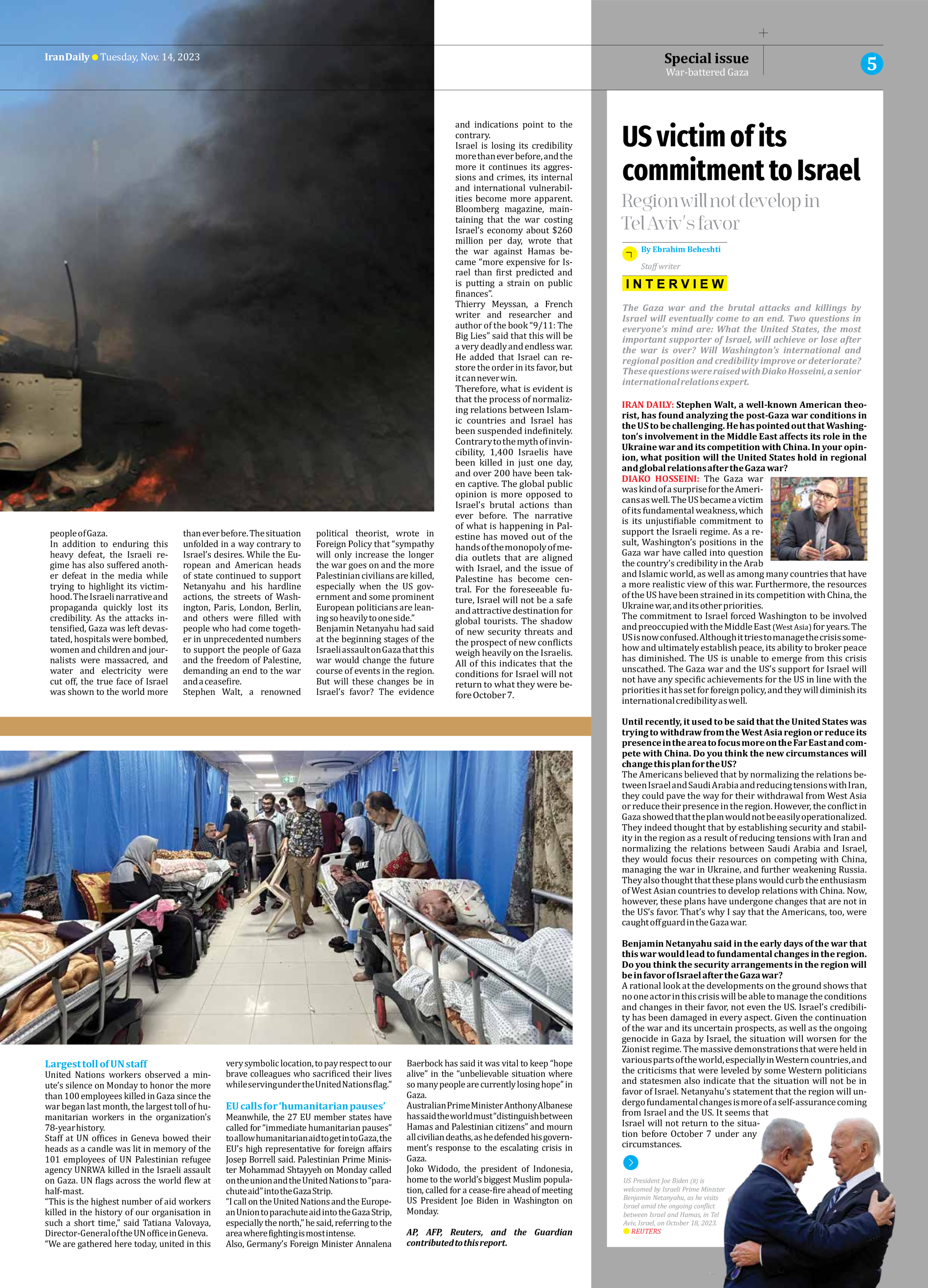
US victim of its commitment to Israel
Region will not develop in Tel Aviv’s favor
By Ebrahim Beheshti
Staff writer
The Gaza war and the brutal attacks and killings by Israel will eventually come to an end. Two questions in everyone’s mind are: What the United States, the most important supporter of Israel, will achieve or lose after the war is over? Will Washington’s international and regional position and credibility improve or deteriorate? These questions were raised with Diako Hosseini, a senior international relations expert.
IRAN DAILY: Stephen Walt, a well-known American theorist, has found analyzing the post-Gaza war conditions in the US to be challenging. He has pointed out that Washington’s involvement in the Middle East affects its role in the Ukraine war and its competition with China. In your opinion, what position will the United States hold in regional and global relations after the Gaza war?
DIAKO HOSSEINI: The Gaza war was kind of a surprise for the Americans as well. The US became a victim of its fundamental weakness, which is its unjustifiable commitment to support the Israeli regime. As a result, Washington’s positions in the Gaza war have called into question the country’s credibility in the Arab and Islamic world, as well as among many countries that have a more realistic view of this war. Furthermore, the resources of the US have been strained in its competition with China, the Ukraine war, and its other priorities.
The commitment to Israel forced Washington to be involved and preoccupied with the Middle East (West Asia) for years. The US is now confused. Although it tries to manage the crisis somehow and ultimately establish peace, its ability to broker peace has diminished. The US is unable to emerge from this crisis unscathed. The Gaza war and the US’s support for Israel will not have any specific achievements for the US in line with the priorities it has set for foreign policy, and they will diminish its international credibility as well.
Until recently, it used to be said that the United States was trying to withdraw from the West Asia region or reduce its presence in the area to focus more on the Far East and compete with China. Do you think the new circumstances will change this plan for the US?
The Americans believed that by normalizing the relations between Israel and Saudi Arabia and reducing tensions with Iran, they could pave the way for their withdrawal from West Asia or reduce their presence in the region. However, the conflict in Gaza showed that the plan would not be easily operationalized.
They indeed thought that by establishing security and stability in the region as a result of reducing tensions with Iran and normalizing the relations between Saudi Arabia and Israel, they would focus their resources on competing with China, managing the war in Ukraine, and further weakening Russia. They also thought that these plans would curb the enthusiasm of West Asian countries to develop relations with China. Now, however, these plans have undergone changes that are not in the US’s favor. That’s why I say that the Americans, too, were caught off guard in the Gaza war.
Benjamin Netanyahu said in the early days of the war that this war would lead to fundamental changes in the region. Do you think the security arrangements in the region will be in favor of Israel after the Gaza war?
A rational look at the developments on the ground shows that no one actor in this crisis will be able to manage the conditions and changes in their favor, not even the US. Israel’s credibility has been damaged in every aspect. Given the continuation of the war and its uncertain prospects, as well as the ongoing genocide in Gaza by Israel, the situation will worsen for the Zionist regime. The massive demonstrations that were held in various parts of the world, especially in Western countries, and the criticisms that were leveled by some Western politicians and statesmen also indicate that the situation will not be in favor of Israel. Netanyahu’s statement that the region will undergo fundamental changes is more of a self-assurance coming from Israel and the US. It seems that Israel will not return to the situation before October 7 under any circumstances.







